Gigabyte Z68X-UD3H-B3 Review
by Brendan van Varik on July 11, 2011 7:01 AM EST- Posted in
- Gigabyte
- Motherboards
- Sandy Bridge
- Z68
LAN Speed Test
LAN Speed Test is a freeware program designed for testing the network connection between two PCs on a home network. The speed of the transfer is limited by the lowest common denominator on the network, so if you have gigabit Ethernet capable computers but a 100 Mbit capable router, you are limit to 100 Mbit transfer. Note that this is really a formality – if a network port is rated at 1 Gbps, then chances are that it will hit at least 90+% of this value. The main test here is CPU usage, and how much is offloaded by the controller. For this test, we use LAN Speed Test to transfer a 1000 MB file across a home network with a 100 Mbps lowest common speed to the same machine each time, in a read/write scenario. CPU usage is taken as a visual max/average from task manager.
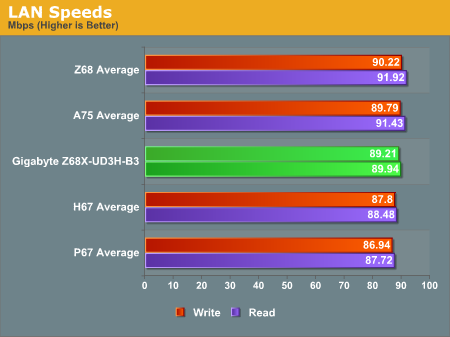
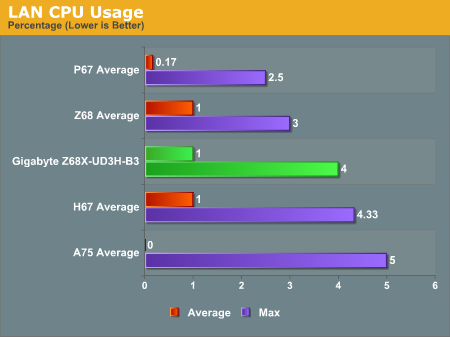
Good to see the Realtek controller doing its job properly here - the board is certainly a very strong contestant in the networking department.
DPC Latency
Deferred Procedure Call latency is a way in which Windows handles interrupt servicing. In order to wait for a processor to acknowledge the request, the system will queue all interrupt requests by priority. Critical interrupts will be handled as soon as possible, whereas lesser priority requests, such as audio, will be further down the line. So if the audio device requires data, it will have to wait until the request is processed before the buffer is filled. If the device drivers of higher priority components in a system are poorly implemented, this can cause delays in request scheduling and process time, resulting in an empty audio buffer – this leads to characteristic audible pauses, pops and clicks. Having a bigger buffer and correctly implemented system drivers obviously helps in this regard. The DPC latency checker measures how much time is processing DPCs from driver invocation – the lower the value will result in better audio transfer at smaller buffer sizes. Results are measured in microseconds and taken as the peak latency while cycling through a series of short HD videos - under 500 microseconds usually gets the green light, but the lower the better.
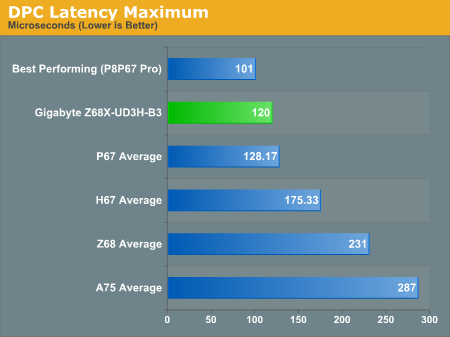
The Gigabyte performs very well - 120us is lower than almost all the other motherboards.
USB Speed
For this benchmark, we run CrystalDiskMark to determine the ideal sequential read and write speeds for the USB port using our 64GB Patriot SuperSpeed USB 3.0 drive. Then we transfer a set size of files from the SSD to the USB drive, and monitor the time taken to transfer. The files transferred are a 1.52 GB set of 2867 files across 320 folders – 95% of these files are small typical website files, and the rest (90% of the size) are the videos used in the Sorenson Squeeze test.
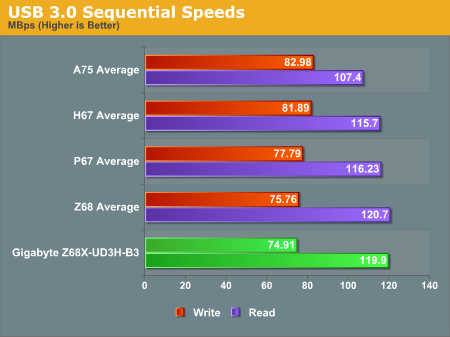
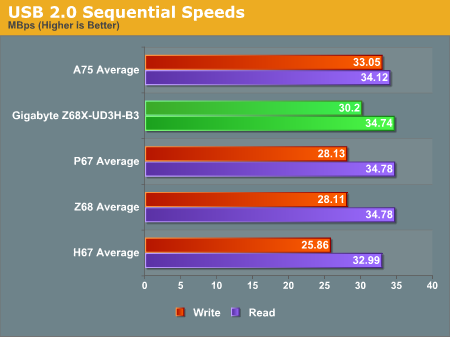
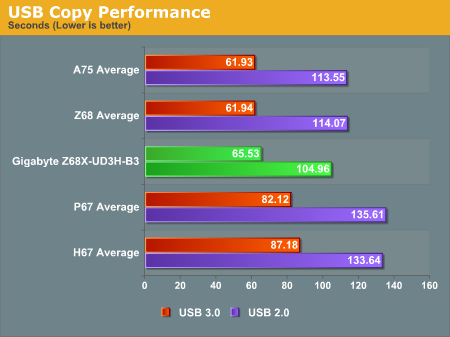
The USB2.0 speeds are more or less all the same. However, this board really shines when it comes to the write speeds. It’s on average 5MB/s faster than most of our boards we’ve tested and is only really contested by ASRocks’ XFast technology. The copy time is fairly average. On the USB3.0 side of things, the results are not anything spectacular.
SATA Testing
We also use CrystalDiskMark for SATA port testing. The operating system is installed on the SSD, and the sequential test is run at the 5 x 1000 MB level. This test probes the efficiency of the data delivery system between the chipset and the drive, or in the case of additional SATA ports provided by a third party controller, the efficiency between the controller, the chipset and the drive.
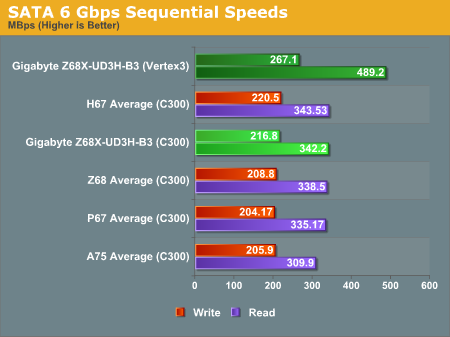
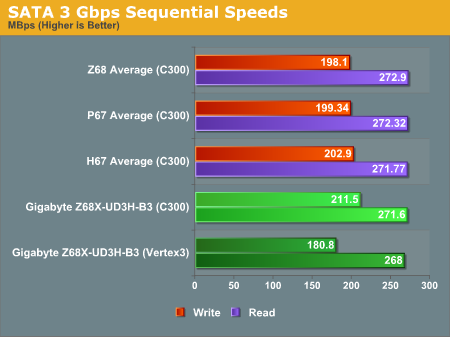










70 Comments
View All Comments
DBissett - Monday, July 11, 2011 - link
What is it with using plural verbs following "Gigabyte", as in "Gigabyte have...." and "Gigabyte do....". This sounds atrocious in an otherwise well written article. Verbs should be "Gigabyte has...." and "Gigabyte does...." because "Gigabyte" is a singular noun. Where's the editor?LtGoonRush - Monday, July 11, 2011 - link
Corporations are treated as plural nouns in most English-speaking countries.Death666Angel - Monday, July 11, 2011 - link
Then Anandtech isn't being consistent, because they treat Apple, for example, as a singular entity, see iPad2 and iOS 4.3 reviews ("Apple has...").As a non native English speaker, I agree with DBissett, reading "Gigabyte have..." is not very intuitive and distracts.
Otherwise, nice article. I'm still using a i7 860 and a AMD 5770 and will use those until the 28nm GFX and 22nm CPUs are around.
Snotling - Monday, July 11, 2011 - link
I noticed it too, but "an SSD" is just as bad... its "a SSD"Exodus220 - Monday, July 11, 2011 - link
Actually, you would be incorrect in stating that it should be written "a SSD." The usage of "a" vs "an" is in regards to the beginning vowel sound of a word, not if it begins with a vowel. Since SSD begins with an "es" vowel sound it requires "an" placed before it. Thus, "an SSD" is 100% correct.awaken688 - Monday, July 11, 2011 - link
Yep. 100% correct.roboray - Monday, July 11, 2011 - link
"As a non native English speaker, I agree with DBissett, reading "Gigabyte have..." is not very intuitive and distracts."As a native English speaker, I agree as well. I can count on my fingers the number of times I have seen corporations treated as plural nouns, and it's always a distraction. It makes me suspect that the editor is someone who got their Master's in English without having actually used the language much for anything other than a topic of study. "Proper" or not, it's not common practice, at least in the US.
Jambe - Monday, July 11, 2011 - link
Get over yourself.I like to go all Grammar Nazi from time to time myself, but seriously. This is a trifle.
joshv - Wednesday, July 13, 2011 - link
This is standard British usage. It's just different, it's not incorrect. You will rarely encounter it in writing by American writers, though the British usage is starting to make some beachheads. It's not at all clear to me that or the other way is more proper or correct. The British just interpret corporate entities as representing multiple people - thus plural.DBissett - Monday, July 11, 2011 - link
I disagree. I've been writing in the US for 50 years and the use of singular verbs with corporate names has only recently begun to creep into otherwise good writing. Check any publication you like. Further, AT is very inconsistent in this regard both between and within articles. The responder below points this out. Also, look in this article's summary, where Gigabyte is used with a mixture of singular and plural verbs.